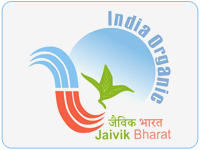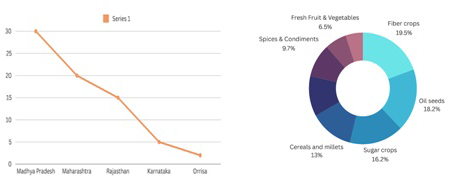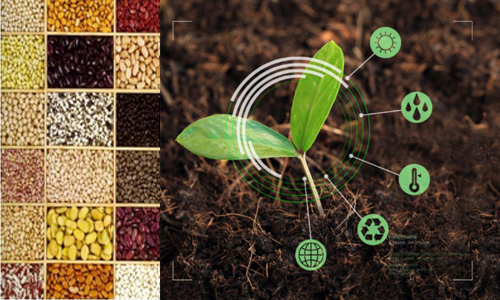
National Programme for Organic Production (NPOP)

INTRODUCTION OF ORGANIC AGRICULTURE
India is bestowed with lot of potential to produce all varieties of organic products due to its various agroclimatic conditions. In several parts of the country, the inherited tradition of organic farming is an added advantage. These holds promise for the organic producers to tap the market which is growing steadily in the domestic and export sector.
steadily in the domestic and export sector.
Organic products are grown under a system of agriculture without the use of chemical fertilizers and pesticides with an environmentally and socially responsible approach. This is a method of farming that works at grass root level preserving the reproductive and regenerative capacity of the soil, good plant nutrition, and sound soil management, produces nutritious food rich in vitality which has resistance to diseases.
As per the available statistics, India's rank 6th in terms of World's Organic Agricultural land and 1st in terms of total number of producers as per 2021 data (Source: FIBL & IFOAM Year Book, 2023).
The APEDA, Ministry of Commerce & Industries, Government of India is implementing the National Programme for Organic Production (NPOP). The programme involves the accreditation of Certification Bodies, standards for organic production, promotion of organic farming and marketing etc. The NPOP standards for production and accreditation system have been recognized by European Commission and Switzerland for unprocessed plant products as equivalent to their country standards. With these recognitions, Indian organic products duly certified by the accredited certification bodies of India are accepted by the importing countries. APEDA is also in the process of negotiation with Australia, South Korea, Taiwan, Canada, Japan etc.
AREA
As on 31st March 2023 total area under organic certification process (registered under National Programme for Organic Production) is 10.17 mha (2022-23). This includes 5391792.97 ha cultivable area and another 4780130.56 ha for wild harvest collection.
Among all the states, Madhya Pradesh has covered largest area under organic certification followed by, Maharashtra, Gujarat, Rajasthan, Odisha, Karnataka, Uttarakhand, Sikkim, Chhattisgarh, Uttar Pradesh and Jharkhand.

PRODUCTION
India produced around 2.9 Million MT (2022-23) of certified organic products which includes all varieties of food products namely Oil Seeds, fibre, Sugar cane, Cereals & Millets, Cotton, Pulses, Aromatic & Medicinal Plants, Tea, Coffee, Fruits, Spices, Dry Fruits, Vegetables, Processed foods etc. The production is not limited to the edible sector but also produces organic cotton fibre, functional food products etc.
food products namely Oil Seeds, fibre, Sugar cane, Cereals & Millets, Cotton, Pulses, Aromatic & Medicinal Plants, Tea, Coffee, Fruits, Spices, Dry Fruits, Vegetables, Processed foods etc. The production is not limited to the edible sector but also produces organic cotton fibre, functional food products etc.
Among different states Madhya Pradesh is the largest producer followed by Maharashtra, Rajasthan, Karnataka, and Odisha. In terms of commodities, Fiber crops are the single largest category followed by Oil Seeds, Sugar crops, Cereals and Millets, Medicinal/ Herbal and Aromatic plants, Spices & Condiments, Fresh Fruit Vegetable, Pulses, Tea & Coffee.
EXPORTS
The total volume of export during 2022-23 was 312800.51 MT. The organic food export realization was around INR 5525.18 Crore. Currently the organic products are exported to various countries including USA, European Union, Canada, Great Britain, Switzerland, Turkey, Australia, Ecuador, Korea Republic, Vietnam and Japan.

APEDA understands that the organic products category is part of an ever-changing industry that is evolving to meet the needs of consumers and shoppers alike. Quality is in our DNA, from seed to shelf. Part of the APEDA difference is our company wide, laser-like focus on providing quality products for our consumers and quality service for our business partners.
We are committed to leading the way in adopting new ideas and approaches that are essential if we are to preserve our remaining vital carbon sinks and high value ecosystems. In parallel with decarbonizing our production and logistics operations, we are committed to eradicating food waste ,preserving biodiversity, and globally promoting the role that our organic products play in a sustainable world. “As a global citizen, we are committed to help feed Planet Earth in 2050 within a science-based carbon footprint that meets international agreements.”
Please note: 1 metric unit of mass equivalent to 1000 kilograms






